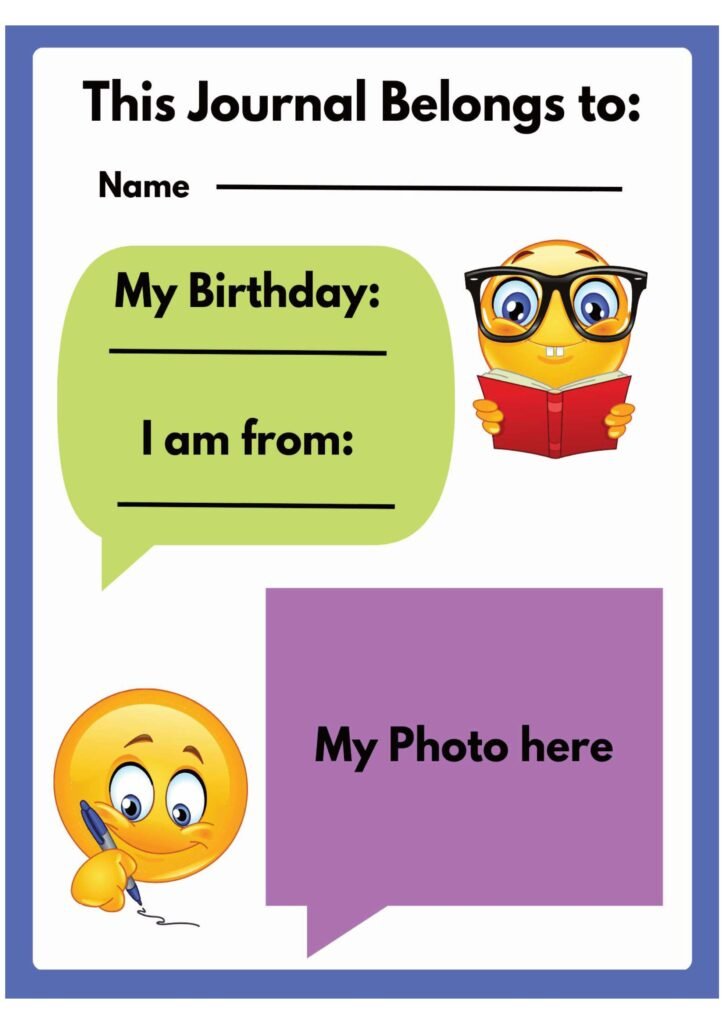“Unveiling the Power of Journaling: A Journey from Strangers to Best Friends in Parent-Child Relationships”
Discover the incredible transformation brought on by journaling in parent-child relationships.
In today’s fast-paced world, it’s quite common for families to feel a bit disconnected, even when they’re under the same roof. The daily rush often leaves little time for meaningful conversations, which can create emotional distance. It’s truly crucial to build strong emotional bonds and keep communication open within the family. These elements are key to creating a healthy and supportive family environment.
Enter the transformative power of journaling. This simple yet profound practice offers a unique avenue for parents and children to bridge the gap that modern life can create. By engaging in journaling, both parties can express their thoughts, feelings, and experiences in a structured, reflective manner. This not only enhances their understanding of one another but also builds a foundation of trust and empathy.
This blog will delve into the myriad ways in which journaling can serve as a catalyst for deeper connections within the family unit. From shared journaling activities to individual reflective practices that can later be discussed, we will explore how this tool can foster mutual understanding and emotional intimacy. Through the journey of journaling, parents and children can move from being mere cohabitants to becoming best friends, united by a stronger, more resilient bond.
In today’s fast-paced world, the emotional gap in parent-child relationships is a prevalent issue. Busy schedules are a significant contributing factor. Parents and children often find themselves overwhelmed with work, school, and extracurricular activities, leaving little time for meaningful interactions. This lack of quality time can create emotional distance, as both parties may feel that their needs and concerns are not being acknowledged.
Generational differences further complicate the dynamic between parents and children. Each generation grows up in a distinct cultural and technological environment, which shapes their perspectives and values. For example, parents might struggle to understand the digital world that is second nature to their children, leading to misunderstandings and a lack of common ground. This generational divide can make it challenging to relate to one another, contributing to feelings of isolation.
Another critical factor is the lack of communication. Effective communication is the cornerstone of any strong relationship. However, in many families, open and honest conversations are rare. Parents might hesitate to share their vulnerabilities, fearing it could undermine their authority, while children might struggle to articulate their emotions or fear judgment. This communication gap can result in misunderstandings, fostering a sense of alienation and emotional disconnection.
The consequences of these emotional gaps are far-reaching. They can lead to a breakdown in trust and support, making it difficult for family members to rely on each other during challenging times. Furthermore, unresolved emotional issues can manifest in behavioral problems, mental health concerns, and strained family dynamics.
Addressing these emotional gaps is crucial for building a healthier, more supportive family dynamic. By acknowledging the factors that contribute to emotional distance, families can take proactive steps to bridge the gap. Whether through intentional quality time, fostering open communication, or finding common interests, these efforts can transform the parent-child relationship, turning strangers into best friends.
Journaling is a powerful tool for self-expression and reflection. As a practice, it involves regularly writing down thoughts, experiences, and feelings, providing a structured outlet for introspection. Over time, various forms of journaling have emerged to cater to different needs and preferences.
Reflective journaling, for instance, involves documenting daily experiences and reflecting on them to gain insights and learn from past actions. Gratitude journaling, on the other hand, focuses on listing things one is thankful for, fostering a positive outlook and greater appreciation for life. Creative journaling blends art and writing, allowing individuals to express themselves through sketches, doodles, and creative writing, which can be particularly therapeutic.
The history of journaling dates back centuries, with notable figures like Leonardo da Vinci and Anne Frank using journals to document their thoughts and lives. Historically, journals have served as valuable records of personal and cultural histories. In recent times, the practice has gained popularity as a means to improve mental well-being and enhance personal growth.
Research has demonstrated that journaling offers numerous benefits. It can help improve mental health by reducing stress and anxiety, as expressing thoughts on paper often provides clarity and emotional relief. Enhanced communication skills are another benefit, as the process of writing can help articulate thoughts more clearly and effectively. Additionally, journaling can strengthen relationships, including parent-child bonds, by fostering better understanding and empathy.
Overall, journaling is a versatile and accessible tool that offers significant benefits. Whether through reflective writing, gratitude logs, or creative expression, journaling provides a meaningful way to process experiences and emotions, ultimately leading to improved mental health, communication, and relationships.
How Journaling Together Strengthens Bonds
Journaling together serves as an invaluable tool for strengthening the parent-child relationship. By sharing thoughts and feelings through written words, parents and children can foster deeper understanding and empathy. This mutual exchange allows both parties to express their emotions and perspectives in a safe and structured manner, facilitating open communication and trust.
One practical example of journaling activities that can enhance this bond is letter writing. Parents and children can write letters to each other, expressing their thoughts, feelings, and experiences. This not only provides an opportunity for introspection but also allows each party to see the world through the other’s eyes. Such exercises can reveal insights into each other’s lives that might not surface in everyday conversations.
Another effective journaling activity is keeping a shared journal. This can be a notebook where both parent and child contribute entries regularly. Topics can range from daily experiences to personal dreams and aspirations. The act of sharing a common space to document thoughts can create a sense of unity and partnership. It also serves as a tangible record of the evolving relationship, one that both can look back on with fondness and reflection.
Establishing a weekly journaling routine can also be highly beneficial. Setting aside a specific time each week dedicated to journaling ensures consistent engagement and makes it a valued ritual. This routine can include themed prompts, such as gratitude lists, reflections on the week, or goals for the future. By making journaling a regular activity, it becomes an anticipated and cherished part of the relationship.
In essence, journaling together can significantly enhance the parent-child bond by providing a structured yet creative outlet for sharing and understanding. Through activities like letter writing, shared journals, and weekly routines, parents and children can deepen their connection, fostering a relationship built on empathy and mutual respect.
Tips for Getting Started with Journaling
Embarking on the journaling journey as a parent and child can be both a rewarding and transformative experience. To ease into this practice, it’s essential to start with simple prompts or questions that can stimulate conversation and reflection. Examples include “What was the best part of your day?” or “What is something new you learned today?” These open-ended questions encourage thoughtful responses and foster deeper communication.
Consistency plays a pivotal role in establishing a successful journaling habit. Dedicate specific times in your daily or weekly schedule for journaling. This could be a quiet moment before bed, during a weekend morning, or after dinner. The key is to find a time that works well for both parent and child, ensuring that it becomes a regular and anticipated activity.
Creating a comfortable and inviting journaling space can significantly enhance the experience. Choose a quiet, clutter-free area where both parent and child feel relaxed and focused. This space should be conducive to reflection and creativity, free from distractions such as electronic devices or background noise. Consider adding personal touches, like favorite cushions or inspiring artwork, to make the space more inviting.
Equally important is selecting the right materials for journaling. Notebooks and pens should cater to personal preferences, as the right tools can make the process more enjoyable. For children, colorful notebooks with engaging designs and easy-to-use pens might add an element of fun. Parents might prefer a more classic or sophisticated journal and a smooth-writing pen to suit their tastes. The goal is to choose materials that inspire and motivate both to engage in the practice consistently.
By starting with simple prompts, setting aside dedicated journaling time, and creating a comfortable space with the right materials, parents and children can seamlessly integrate journaling into their routines. This practice not only enhances their relationship but also fosters personal growth and mutual understanding.
Introducing The all-in-one Journal ‘Adventures of Me!’
In the modern age, where screens often dominate our daily interactions, finding meaningful ways to connect with our children can be challenging. Enter the ‘Adventures of Me! A Book of Journaling, Scrapbooking, and Coloring’ – a vibrant and interactive resource designed to bridge the gap between parents and children through the timeless art of journaling. This book offers a truly unique experience, combining engaging prompts, imaginative activities, and delightful illustrations that captivate young minds and foster deeper connections.
Designed for children aged 7 and up, ‘Adventures of Me!’ features 130 pages packed with opportunities for self-expression and creativity. Each page invites children to explore their thoughts and feelings through a variety of journaling prompts, empowering them to articulate their experiences and emotions. The book also incorporates scrapbooking elements, allowing families to preserve cherished memories and moments in a personal and artistic way.
The book’s colorful illustrations and creative activities are tailored to keep young readers engaged and inspired. From drawing prompts that encourage artistic expression to interactive questions that spark curiosity and conversation, ‘Adventures of Me!’ is carefully crafted to nurture a child’s imagination and communication skills. Moreover, the collaborative nature of the book promotes quality time spent together, strengthening the parent-child bond through shared experiences.
For parents seeking to embark on a journaling journey with their children, ‘Adventures of Me!’ is an invaluable tool that blends fun and learning seamlessly. The book is readily available for purchase on Amazon, making it an accessible addition to any family’s toolkit. By integrating journaling into your routine, you can transform everyday moments into treasured memories, fostering a deeper connection with your child.
Discover the joy of family journaling with ‘Adventures of Me! A Book of Journaling, Scrapbooking, and Coloring’ and watch as your relationship with your child blossoms. Purchase your copy today on Amazon and embark on a creative adventure together.




Success Stories: Real-Life Examples of Transformed Relationships
Journaling has proven to be a transformative tool for many families, fostering stronger bonds and deeper emotional connections. One such example is the story of the Johnson family. Jane Johnson, a mother of two teenagers, decided to introduce a shared journal as a way to bridge the communication gap with her children. Over time, this simple practice evolved into a meaningful ritual that allowed each family member to express their thoughts and feelings openly. Jane recalls, “Our journal became a safe space for us. We began to understand each other better, and it significantly improved our family dynamics.”
Similarly, the Martinez family experienced remarkable changes through journaling. Maria Martinez, a single mother of a 10-year-old son, used journaling to nurture trust and understanding. Initially, her son was hesitant, but as they continued to write to each other, he grew more comfortable sharing his emotions. Maria shares, “Journaling helped us uncover thoughts and feelings that we might not have expressed otherwise. It brought us closer and created a bond built on trust and empathy.”
Another inspiring story is that of the Brown family. After facing several challenges, including relocation and adjusting to a new environment, the Browns found solace in journaling. Sarah Brown, the mother, initiated the idea to document their daily experiences and reflections. This practice not only helped them cope with the changes but also strengthened their emotional connection. Sarah notes, “Through our journaling, we could see things from each other’s perspectives. It made us more patient and understanding, turning a tough period into an opportunity for growth.”
These success stories highlight the profound impact of journaling on parent-child relationships. By providing a platform for open communication and emotional sharing, families can foster a deeper connection and build a foundation of trust and understanding. These real-life examples serve as a testament to the power of journaling in transforming relationships, inspiring others to embark on their own journaling journey with their children.
Conclusion: Embrace the Journey of Journaling
Throughout this blog post, we have explored the profound impact that journaling can have on parent-child relationships. From fostering open communication and mutual understanding to providing a safe space for expressing emotions, journaling serves as a powerful tool in bridging gaps and nurturing deeper connections. By consistently engaging in this practice, parents and children can transform their relationship, moving from mere acquaintances to best friends.
It is essential to approach journaling with an open heart and mind, understanding that the journey itself holds as much value as the destination. Each entry, conversation, and shared moment contributes to building a stronger bond, piece by piece. The process invites both parents and children to listen, reflect, and grow together, creating a foundation of trust and empathy.
We encourage you to embark on your journaling journey, embracing the potential for transformation and growth. Remember, there is no right or wrong way to journal; the key is to be consistent and genuine in your efforts. As you begin to see the positive changes in your relationship, let them serve as motivation to continue this meaningful practice.
We invite you to share your own journaling experiences or any questions you may have in the comments section below. Your stories and insights can inspire others to start their journey and strengthen their own parent-child relationships. Together, we can build a community of support and encouragement, celebrating the small and significant moments that journaling brings into our lives.

pNSjvd Jef tgBcGKH OIqJiYNw
skioOMv LjoPso imgtoUL qvwqJ
wzfluqjphovsfuyzeqiunmdwzowouq